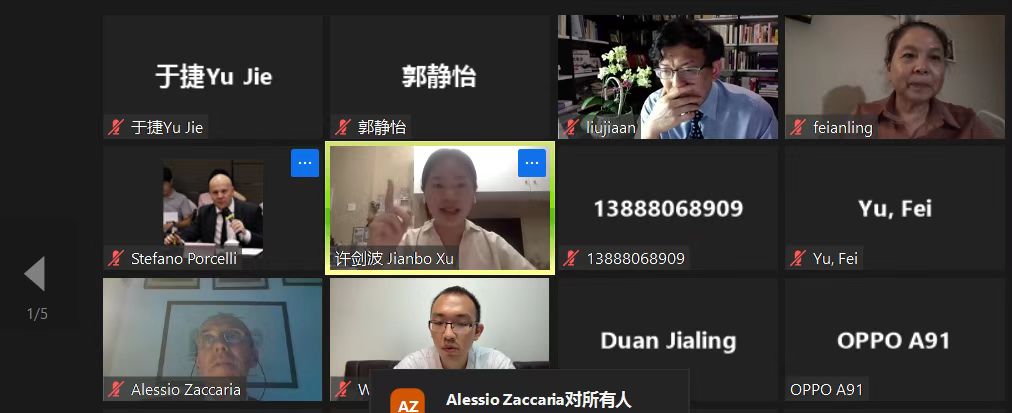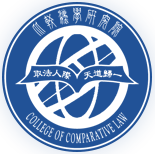Professor Alessio Zaccaria, civil law professor emeritus at the University of Verona, gave a lecture on Social Contact online to the students at the invitation of the College of Comparative Law on the evening of 23 May, 2022.

Prof. Zaccaria gained the honorary PhD of the University of Buenos Aires (UBA) and honorary PhD (Dr. jur. h.c.) of the University of Bayreuth. He is the recipient of the Humboldt Research Award and the Scientific Excellence Award of the SISDiC (Italian Society of Civil Law Scholars). He is also the President of the International Academy of Inheritance Law and a former member of the Superior Council of the Judiciary (CSM).
The lecture was hosted by the Institute of Sino-Italian Law and Roman Law of the College as an academic celebration of the 70th anniversary of CUPL. Director of the Institute & Director of the Academic Committee of the College Prof. Fei Anling moderated the lecture. Dean of the Civil, Commercial and Economic Law School Prof. Yu Fei, Director of the Civil Law Institute of the School Prof. Liu Jiaan, Assistant to the Director of the Institute of Sino-Italian Law and Roman Law Dr. Xu Jianbo joined the discussion in the lecture.
At the beginning, Fei Anling made an opening speech and expressed her heartfelt thanks to Zaccaria for accepting the invitation of the online lecture and her sincere gratitude to the distinguished guests Yu, Liu and Xu for their active participation.
Then Zaccaria started from the origin of social intercourse and took the issue that Italian judges widely adopt the theory of “social contact” to adjudicate since the end of last century as an introduction to analyze whether ‘social contact' can be regarded as the general origin of debt. He explored the elements of social contact from different angles and pointed out that neither trust nor social cooperation obligation is the core element of social contact as it cannot be found in the legal norms of the normative basis to become a general source of debt. He then explained three different types of social contact, including 1) the contact with the nature of a legal act as a general source of debt, such as contracting; 2) the contact with the nature of a similar legal act as a general source of debt, such as acts of friendship; 3) and other contact that are different from the above two types, such as the absence of a direct contractual relationship between teachers and students, and the fact that teachers teach students for a fee rather than for a favour so this social association cannot be regarded as a general source of debt. Finally, Zaccaria summed up his point of view that only contact with the nature of legal acts and similar nature is the general source of debt and social contact theory cannot be generalized applied; otherwise, there will be no liability outside the contract.

Fei summarized Zaccaria's content and she also objected to the abuse of the theory of social contact in Italian justice. At the same time, she pointed out that China is also faced with the interpretation of the norms of the Civil Code. When interpreting the law, people should do it according to the basic principles of the law, the purpose of the country’s legislation and the condition of the country.
Liu first combed the content of Zaccaria's lecture, then pointed out the difference between tort liability regulation in China and Europe. The tort liability stipulated in China's law is easier to realize than that stipulated in Europe, and its safety guarantee obligation is stipulated in detail. In Italy, the rules of tort liability are strict, so when people seek to protect the rights of the injured, they resort to the theory of social contact to find a way of explanation.
Yu pointed out that the contract of legal relations and tort legal relations in addition to the third legal relations, will have a higher duty of care to others. The original intention of this kind of legal relationship is to pursue a better society, but too high a duty of care will restrict people's freedom and go against the original intention of pursuing a better society. Therefore, people should pay attention to the balance between freedom and duty of care.
Xu explained her understanding of the lecture with a case in which a judge in the field of Italian labor law decided that an employee should win a lawsuit and an employer should lose a lawsuit to protect the vulnerable group based on the theory of ‘Duty of Trust’. She challenges the fact that Chinese courts often make decisions in favor of workers on the basis of the principle of “favoring the protection of workers”, regardless of whether the employer has violated its post-contract obligations. She believed that in the economic downturn, judgements should not blindly protect workers, but also take employers' pressure into consideration, balancing the relationship between the two.
The lectured ended after a hot discussion between Zaccaria, guests and the audiences.












